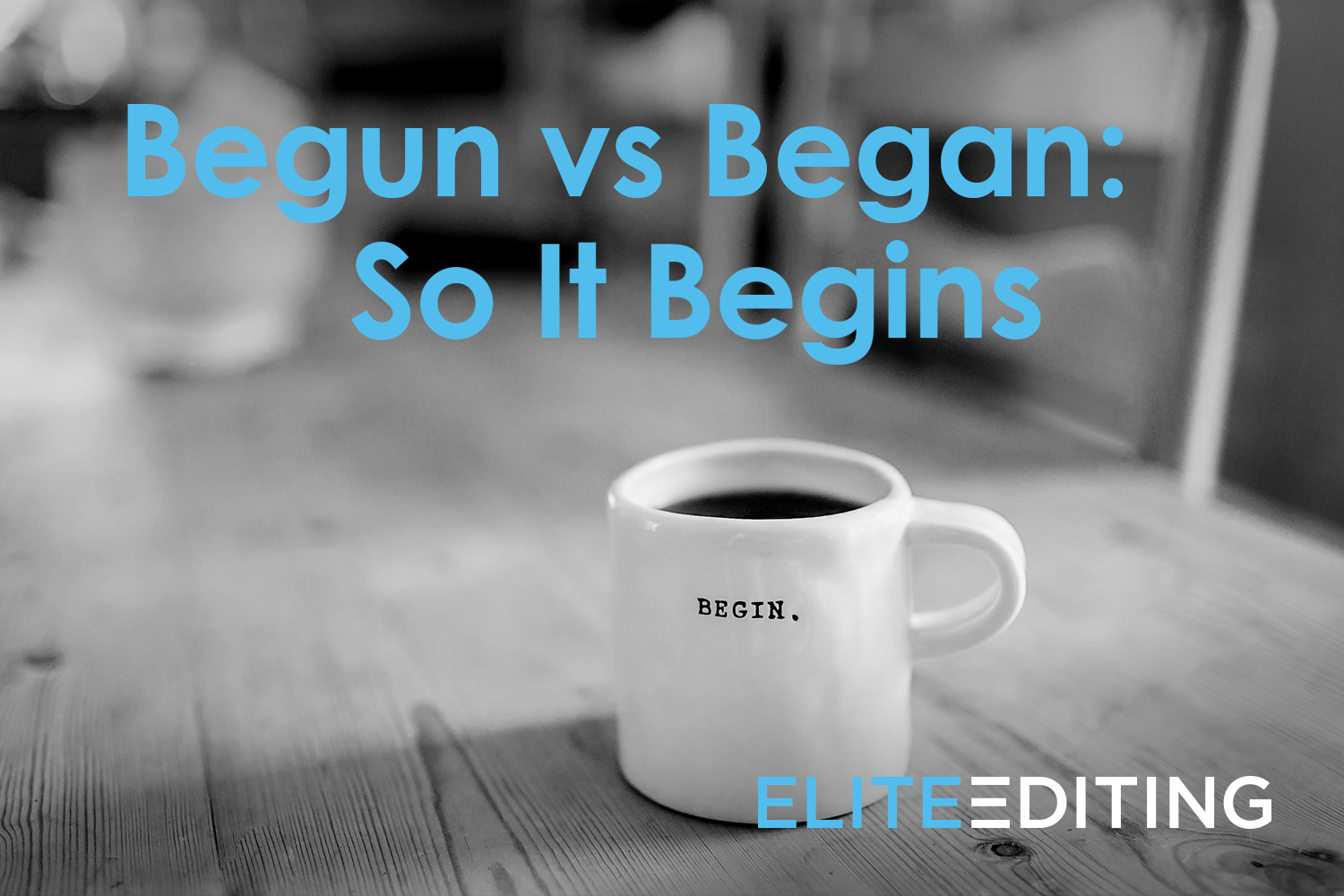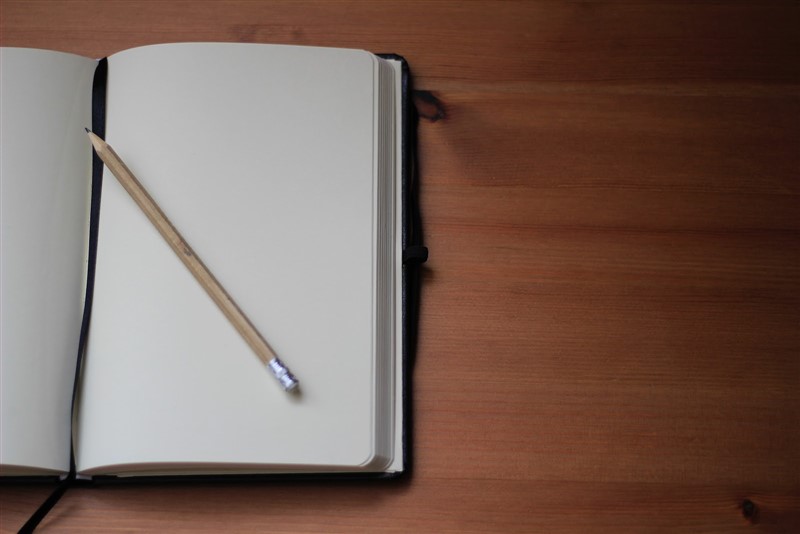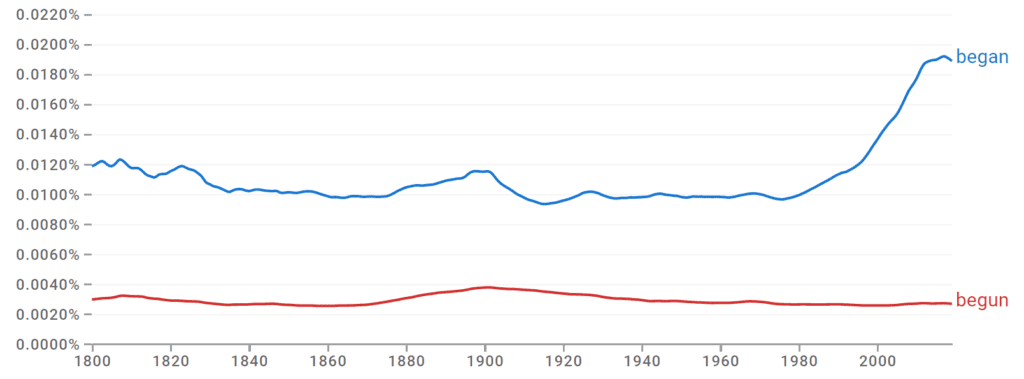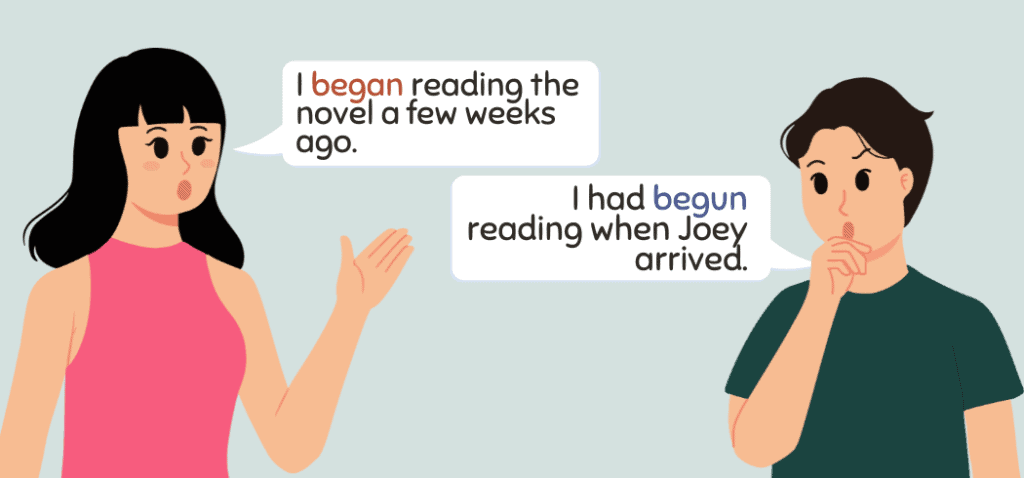What is the difference between began and begun?
Misusing the words began and begun is one of the most common mishaps in English grammar. Sure, the words look and sound similar enough, but there’s a right and wrong way to use them in a sentence.
The words began and begun are different forms of the irregular verb “to begin.” We use the verb “begin” for actions that ‘start,’ ‘initiate’ or ‘launch’ an activity or process. For example,
“Dinner begins with an appetizer.” (present tense)
“We began dinner with an appetizer.” (simple past tense)
“We’ve begun to eat dinner.” (present perfect tense)
As shown above, we use “began” for the past tense and “begun” as the past participle for all perfect tenses. Additional verb forms include begins (plural present) and beginning (present continuous/progressive).
”To begin” as an irregular verb…
There are several reasons why began and begun are commonly confused words, starting with the irregularities of the verb “begin.” Regular verbs consist of a simple past tense form with a present and past participle. Additionally, a regular verb’s simple past and past participle ends with -ed, such as “learned,” “passed,” or “separated.”
If “begin” were a regular verb, the past tense and past participle forms would look something like “begined”–– which is, clearly, not the case. Instead, the verb tense forms of begin look something like this:
- Simple past tense: began
- Present tense: begin/begins
- Future tense: begin
- Progressive tense: beginning
- Perfect tenses: begun
Beginner vs. beginning?
Another reason why it’s easy to confuse began vs. begun: similar, yet different words that start with “begin.” Do the nouns “beginner” or “beginning” ring a bell?
In addition to acting as the progressive tense form, the word “beginning” is also a noun. As explained by The American Heritage Dictionary, the noun “beginning” is ‘the time or place when something starts,’ ‘the earliest time of initiation,’ or ‘a source or cause.’ In this case, telling someone to “start at the beginning” is different from saying “something is beginning.”
Likewise, the noun (or adjective) “beginner” describes someone or something deemed ‘entry-level,’ ‘new,’ or ‘just starting to learn something.’ For example, if you’re taking an ESL class, you might be a “beginner-English student.” Or, if you start a new exercise class, you could enroll in a “beginner’s course” to get started.
What does begin mean?
The word begin is an irregular verb that means ‘to start,’ ‘arise,’ ‘perform,’ or ‘undergo the initial part of an action.’ Specific definitions and examples of “begin” include:
1. To initiate or ‘set about’ an activity or process. For example,
“She began writing after work.”
“Let’s begin with chapter 4.”
“The race begins at noon.”
“He’s in the beginning process of cleaning the garage.”
“They’ve already begun reading.”
2. To arise or originate in existence. For example,
“My life began in the early 90s.”
“A new day begins whether you like it or not.”
3. To establish or start an organization, process, or activity. For example,
“The book club began with only three members.”
“The private school was begun by local chapter members.”
Phrases with the verb begin:
As noted by Lexico, English speakers use the verb begin for several phrases, including:
- “Begin/began to do something:” to start at an initial task, time, or place.
- “Begin with:” to start with an initial element.
- “Begin on/upon:” to start working or stating something.
- “Begin at:” a minimum cost of something or to not have any likelihood of occurring.
- “To begin with:” to start with something first.
Synonyms
Actualize, appear, arise, commence, constitute, develop, embark, emerge, enter, establish, form, found, generate, inaugurate, initiate, innovate, institute, launch, materialize, open, originate, pioneer, start, surface, take-on, undertake.
Antonyms
Abolish, annihilate, annul, cease, close down, conclude, destroy, discontinue, end, expire, finish, halt, lay off, nullify, phrase out, shut up, stop, terminate, wrap up, quit.
Etymology of begin
According to The New Oxford American Dictionary, the word begin originated with Old English beginnan via early Germanic languages and is related to Dutch and German beginnen (“Begin” 150).
How to use began vs. begun in a sentence?
Now that we understand the definition and irregularities of the verb ‘to begin,’ it’s time to learn how to craft “began” and “begun” into a sentence. As a partial recap, let’s look at which verb tenses we use for all verb forms of begin.
Begin:
- Present tense: begin/begins
- Future tense: will begin
Began:
- Simple past tense: began
Begun:
- Future perfect tense: will have begun
- Present perfect tense: have/has begun
- Past perfect tense: had begun
Beginning:
- Present continuous tense: am/are beginning
- Past continuous tense: was/were beginning
- Future continuous tense: will be beginning
- Present perfect continuous tense: have/has been beginning
- Past perfect continuous tense: had been beginning
- Future perfect continuous tense: have been beginning
When to use began vs. begun
As shown through prior verb lists, the only time we use “began” is for the simple past tense. For example,
“I began reading Jane Austin novels.”
“He began every text message with an emoji.”
“They began dancing and singing.”
Meanwhile, the word “begun” only occurs for the past, present, and future perfect tenses. Example sentences include,
“By Friday, every resident will have begun the voting process.” (future perfect)
“The city has begun decorating for fall.” (present perfect)
“We had begun celebrating by then.” (past perfect)
Writing tips for begun vs. began
The second lesson for using “begun” and “began” involves grammar and context:
Use “began” to reference a former title
If you’re looking to reference someone’s former or initial role, “began” is the best word choice. For example:
- Correct: “She began as the assistant.”
- Incorrect: “She begun as the assistant.”
Using “began” with inanimate subjects?
If you use “began” with an inanimate object or thing, the verb may imply that something originated or materialized into existence. For example,
“Crater Lake began as a natural disaster.”
“The post office began their deliveries at 5 a.m.”
“The floor began to shake.”
Only use “to” before “begin”
Whenever you read the word “to” before a verb, that’s because it’s written in the infinitive form (e.g., ‘to begin’). The infinitive form of a verb only contains the root word, so it’s incorrect to use other tense forms.
- Use: “to begin.”
- Don’t use: “to began,” “to begun,” “to beginning,” etc.
One last note: If you choose to use the infinitive phrase, beware of using “with” afterward. According to Garner’s Modern English Usage, “to begin” is an introductory phrase that we use to enumerate a reason. Therefore, writing the phrase “to begin with” can imply a chronological order, whether it’s intended or not (Garner 102).
To illustrate, compare the implied meaning of each example sentence:
- “We are going to begin with reading.” vs. “We are going to begin reading.”
- “She’s to begin with Spanish 101.” vs. “She’s to begin Spanish 101.”
Can you tell the difference? The examples above all convey a command, but using “with” appears more demanding because it implies a negated option. Let’s look at one more:
- “I don’t know what to begin with.” vs. “I don’t know what to begin.”
For the final example, the appearance of “with” nearly changes the entire meaning of the sentence. The first example implies there are several options ‘to start,’ but the second example can imply that someone is confused or unaware of a task at hand.
Avoid using auxiliary verbs with “began”
One of the trickier rules for “began” involves auxiliary verbs or ‘helping verbs.’ Most English speakers are aware of other auxiliary verbs like “to have,” “to do,” or “to be” because they allow other verbs to express their tense forms. But in the case of ‘begin,’ we don’t use auxiliary verbs for its past participle form.
As noted by GMEU, linguists have made examples of phrases like ‘has began’ as “careless speech” and “writing” since 1951–– a writer’s worst nightmare, if you ask us (Garner 102). To avoid these embarrassing call-outs, avoid pairing auxiliary verbs with “began” at all costs!
Correct:
- “He will begin.”
- “She has begun.”
- “We have begun.”
- “I will have begun.”
Incorrect:
- “He will began.”
- “She has began.”
- “We have began.”
- “I will have began.”
Want to learn more about verbs?
If you enjoyed learning about began vs. begun, check out our recent posts on verbs like:
- Inquire vs. enquire?
- Is vs. are?
- Lets vs. let’s?
- Into vs. in to?
- Chose vs. choose?
Test Yourself!
Confusing words like began and begun have a bad rap for a reason. See how well you understand their differences with the following multiple-choice questions.
- True or false: “began” and “begun” are different forms of the verb “begin.”
a. True
b. False - The word ____________ is the past participle form of begin.
a. Began
b. Begin
c. Begun
d. Beginning - The word ____________ is the simple past tense form of begin.
a. Began
b. Beginning
c. Begun
d. Begin - Forms of the irregular verb “begin” don’t include _____________.
a. Begins
b. Beginner
c. Beginner
d. Began - The future tense of the verb “begin” is _____________.
a. Beginning
b. Began
c. Begun
d. Begin
Answers
- A
- C
- A
- B
- D
Sources
- “Begin.” Garner’s Modern American Usage, 3rd ed., Oxford University Press, 2009, pp. 102.
- “Begin.” Lexico, Oxford University Press, 2020.
- “Begin.” The Merriam-Webster.com Dictionary, Merriam-Webster Inc., 2020.
- “Begin.” The New Oxford American Dictionary, 3rd ed., Oxford University Press, 2010, pp. 150.
- “Beginner.” The American Heritage Dictionary of the English Language, 5th ed., Houghton Mifflin Harcourt Publishing Company, 2020.
- “Beginning.” The American Heritage Dictionary of the English Language, 5th ed., Houghton Mifflin Harcourt Publishing Company, 2020.
- “Irregular verbs: overview and list.” OWL at Purdue, Purdue University, 2020.
- “To begin.” Reverso Conjugation, Reverso-Softissimo, 2020.
/ / Uncategorized
What is the Difference Between Began and Begun?
Contents
- 1 What is the Difference Between Began and Begun?
- 2 Using Began in a Sentence
- 3 Using Begun in a Sentence
- 4 Remembering Began vs. Begun
- 5 Outside Examples
- 6 Quiz: Begun vs. Began
- 7 Article Summary
Began and begun are both different forms of the same verb. Therefore, they have the same definition, but are appropriate in different tenses and grammatical contexts.
Began is the simple past tense form of begin, which means to start.
- It all began one day about ten years ago.
Begun is the past participle form of begin.
- We can’t stop this process once it has begun.
Now, let’s look at the specific ways to use these conjugations of begin, as well as how to avoid common mistakes.
Using Began in a Sentence
When to use began: Began is the simple past tense form of begin. It means to commence or to start.
For example,
- You’re late! Dinner began at 7 o’clock and it is now almost 8:30!
- The snow began falling early in the evening last night and had accumulated to over two feet by early this morning.
There are several idioms and expressions that use the word begin. A couple of these, which are listed below, can also occur in the simple past:
- a journey of a thousand miles begins with a single step: a big project starts with a small action
- The race to find a cure for the horrible disease began with a single step: the discovery of bacteria.
- to begin to see: to start to understand
- When my sister stole my money I began to see that she had become a criminal.
Began occurs more frequently than begun.
Using Begun in a Sentence
When to use Begun: Begun is the past participle form of begin. It appears after the helping verb have in the perfect tenses.
For example,
- You can’t stop the process now. It has already begun.
- By the time the racer realized he had forgotten his shoes, the race had begun.
- Have you begun your homework yet?
There is one proverb that uses begun:
- well begun is half done: if you get a good start to a project, completing the rest of it will be easy
- I know you’re worried about writing a ten-page essay, but you know what they say! Well begun is half done. You’ve already done the research and you’re an expert on the topic. Now all you have to do is write down what you already know.
Between the synonyms begin, start, and commence, start is the most common and commence is the most formal.
Remembering Began vs. Begun
It is possible to use the spelling of these words to remember the meanings.
These words are spelled exactly the same except for the a and the u difference. Usually, when students of English learn the three forms of irregular verbs, they learn in the order of base form, simple past tense form, and past participle form (like go, went, gone). Just as the past tense comes before the past participle form, a comes before u alphabetically.
Alternatively, there are many other irregular verbs that include a stem change from i to a to u from base form to past simple to past participle. Some examples of verbs in that order include swim, swam, swum; drink, drank, drunk; sing, sang, sung; and ring, rang, rung.
Outside Examples
- Hundreds of fans began airing their complaints via social media that they had trouble streaming the pre-fight show via Showtime. –New York Post
- They had been waiting out the storm Saturday in Yeselia Castro’s home, but then the waters began pouring in. They tried putting the children on tables and on the bed to keep out of the water. Their brother-in-law, Jesus, even got on the roof. –LA Times
- Both Cabrera and Wilson have begun the appeals process, Ausmus said before Friday’s game against the Chicago White Sox. –USA Today
- The great eclipse migration has begun. And for those hitting the road late, maybe pack a lunch. Oh, and don’t forget some extra gas. You’re probably already too late for eclipse glasses or a place to stay. –Denver Post
Quiz: Begun vs. Began
Instructions: Fill in the blank with the correct word, either begun or began, in the correct form.
- I may not have __________ this fight, but I sure will finish it!
- The play has already _____________ so the theater won’t let the patrons enter.
- The whole rivalry _______________ about 100 years ago.
Article Summary
Should I use began or begun? These two words are both different forms of the past tense of begin. To know which one to use, you must know if you are using the simple past tense or the perfect tense.
- Began should occur in the simple past tense, for actions that completed in the past.
- Begun should occur in the perfect tenses, as the past participle.
Make sure you are aware of this difference when choosing which of these words to use.
Quiz Answers
- begun
- begun
- began
When speaking or writing English, using the past tense can be confusing. There are many types of tenses when referring to events that have already happened. To make matters worse, English contains many irregular verbs that are conjugated in ways that don’t immediately make sense.
This lack of consistency can (and does) lead to quite a few mistakes. One of the easiest mistakes to make is to misuse began and begun, which are two forms of the irregular verb begin.
In spoken English, the two words are often used interchangeably, but in academic and professional writing, knowing the difference between these words is important.
What is the difference between began and begun? In this article, I’ll explain the differences between began and begun, use these words in a sentence, and demonstrate how to choose began or begun and use each correctly.
When to Use Began

Began is the simple past tense form of begin. It does not need any helping, or auxiliary verbs, like had.
So, while you might say,
- Gavin began to open the package.
You would not say,
- Gavin had began to open the package.
Began is never used with a helping verb.
When to Use Begun

You could say,
- Yasmin had begun to eat the cake.
But you wouldn’t say,
- Yasmin begun to eat the cake.
If you’re using begun, it needs a helping verb in order to be correct.
This brings us to the differences between simple past and past participles. Simple past tense describes things that happened in the past. The sentence “Gavin began to open the package” describes an event that happened in the past. The past participle describes something that happened in the past in conjunction with other events in the past.
“Yasmin had begun to eat the cake” describes one of a sequence of events. For instance, one could say,
- Yasmin had already begun to eat the cake by the time we sang to her.
As you can see, began is not used with a helping verb.
Begun, on the other hand, is always used with a helping verb.
Trick to Remember the Difference

If you find yourself confused, remember that begun rhymes with one, and since begun is a past participle, it needs one more word to go with it: a helping verb.
Summary: Begun vs. Began
Began and begun are two forms of the irregular verb begin.
Began is the simple past conjugation. Began is not used with any helping verb.
Begun is the past participle form. Begun must always have a helping verb to be correct.
If you have trouble deciding which word to use, remember that begun rhymes with one and always needs one helping verb in grammatically correct English.
Being able to use each word accurately when speaking or writing signifies intelligence and professionalism. If you’re having trouble deciding whether to use began or begun, you can always revisit this article as a quick refresher.
Contents
- 1 Began vs Begun: What’s the Difference?
- 2 When to Use Began
- 3 When to Use Begun
- 4 Trick to Remember the Difference
- 5 Summary: Begun vs. Began
Is it began or begun? That’s a good question and one I hear all the time. Both words are correct forms of the verb begin, which means their definition is the same. But they have a massive difference in terms of usage. Learn the difference between begun and began in this guide with writing tips.
Begun vs. Began
Both began and begun are correct. No word is incorrectly spelled. However, their usage differs.
Both begun and began are the past tense forms of an irregular action verb begin. An irregular verb is a verb that does not follow the typical pattern of its past form. That means it does not end in -d or -ed, as in begined.
Begin means to start, undergo, or perform.
- Began is a simple past tense of begin. It does not need a helping verb.
Example: I began drinking coffee at 7 AM.
- Begun is the past participle of begin. We use it with helping verbs like have, has, or had to form perfect tenses. Sometimes, we use it as an adjective for modifying a noun or pronoun.
Example: We’ve only just begun eating dinner.
Do not use began in perfect tenses. For example:
- Incorrect: We had began eating when Joey arrived.
- Correct: We had begun eating when Joey arrived.
Do not use begun in the simple past tense. For example:
- Incorrect: She begun watching TV ten minutes ago.
- Correct: She began watching TV ten minutes ago.
Using Began in a Sentence
- I began reading the novel a few weeks ago.
- The crowd began to clap after the band’s memorable performance.
- It began to rain the minute the event ended.
- Excerpts of residents’ panicked conversation began to circulate on social media, along with videos of the emergency response. They showed fire crews struggling to get around barriers to approach the building. (Wall Street Journal)
- A World Cup that began in controversy and uncertainty will end with history being made, though exactly what kind of history remains to be seen. Perennial favorites Germany, Belgium, England, Spain, and now Brazil are out. Morocco, France, Croatia, and Argentina remain. (LA Times)
Using Begun in a Sentence
- I will have begun law school after graduating with my first degree.
- The game had already begun by the time we found our seats in the arena.
- We have begun searching for the lost puppy.
- A probe into the firefighting operation linked to the death of a full-time Singapore Civil Defence Force (SCDF) national serviceman has begun and the findings will be made public in time. (Strait Times)
- WNBA star Brittney Griner has begun serving her nine-year sentence for drug possession at a Russian penal colony, her lawyers and agent said Thursday. (AP News)
How to Remember the Difference
It can be challenging to remember the differences between began and begun.
But just remember: Began is in past tense and requires no helping verb, while begun is in past participle form with a helping verb.
Is Began Past Tense?
Yes, began is the past tense of begin. For example:
- We began planning the project yesterday.
Is It Has Begun or Has Began?
The correct verb phrase is has begun. It’s the present perfect form of begin if the subject is singular. The present perfect tense is formed using has or have plus the past participle form of a verb. For example:
- The teacher has begun checking our assignments.
Final Word on Began or Begun
Began and begun are not alternative spellings of each other so don’t fall prey to common mistakes like this in your writing. To know which word you should use, remember:
- Began is the simple past conjugation.
- Began is the past participle form that is used with a helping verb.

You use the verb begin to show that a process has started. Both begun and began are past tense forms of begin. Begun vs. began can be so confusing because begin is an irregular verb (also known as an “action verb,” or a word that shows that something is happening: run, paint, jump, etc.). An irregular verb is one that, when taking its past tense form, doesn’t follow the usual grammar rules. That’s one of the reasons that it’s so easy to mix up began and begun.
Knowing When to Use Begun vs. Began
The main thing to know about begun vs. began is that begun is the past participle form of the verb begin. That means it has to refer to something that happened in the past. However, for begun to be used properly, it has to be paired with another verb, like has, had, or have. Begin, on the other hand, is the simple past tense form, which in this case means it doesn’t get paired with has, had, or have. Some examples below will clarify how this works in practice.
Examples of Begun
Let’s look at two examples: the first example is incorrect, and the second is correct.
- Incorrect: I begun the essay when my little brother interrupted me.
- Correct: I had begun the essay when my little brother interrupted me.
As you can see, the correct example includes the word had, which is one of the verbs that must be paired with begun for the usage to be correct.
Examples of Began
Here are two examples of began. Again, the first example is wrong while the second is correct.
- Incorrect: The conference finally had began at eight thirty even though it was supposed to start at seven.
- Correct: Dinner began at six o’clock—right on time.
The examples above show that forms of the verb have are never paired with began when it’s being used in the past tense.
To review, let’s do just a few more begun vs. began examples. First we’ll look at two correct examples of begun and then two correct examples of began:
- I had begun to wrap up my project when my tablet crashed, erasing all my work.
- Now that they’re locked up in prison, both robbers have begun to rethink their actions.
- I stubbed my toe and began whining but then realized that there are much worse things that can happen to a person.
- My boat’s engine began to sputter, and I feared it might be low on gasoline.
Hopefully these examples clear up your confusion. Just remember that there’s always more to learn…your grammatical journey has only just begun!
YOU MIGHT ALSO LIKE
What Is a Run-On Sentence?
Few grammatical blunders are as irritating as the run-on sentence. In fact, they can be downright hazardous to your health if you’re reading aloud. Unless…
Who’s Right? Explaining Whose vs. Who’s
Everyone makes the occasional typo or grammatical slip-up. That’s why we have editors—and Facebook friends who insist on correcting our use of whose vs. who’s…







